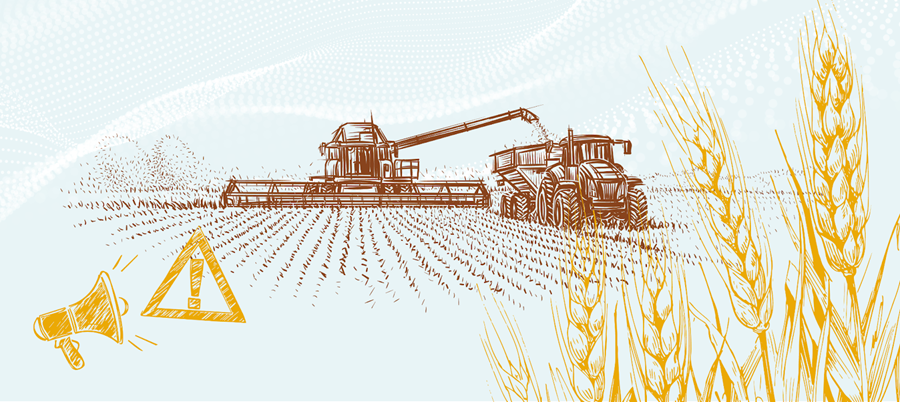
Bioceres GM HB4 Wheat Gains Traction Worldwide
Wheat is a grain fundamental to global health and food security across the world. Our breads, pastas, and other wheat-based foods take up a major portion on our plates, providing an estimated 20% of calories globally. Other principal crops such as corn and soy, which are mostly GMO, are fed to livestock -- not directly to us. Traditionally, consumer acceptance of GMO wheat has been low because we eat wheat at the dinner table. However, with war, supply chain disruption and climate change, genetically modified wheat companies are making the claim that now is the time to release patented GM wheat grains for human consumption into the market. With increased privatization in our food supply, consumers and farmers alike are concerned about consolidation, contamination, and control.
Since 2020, when Bioceres Crop Solutions (Bioceres) announced the regulatory approval of its genetically modified (GM) HB4 wheat by Argentina’s Ministry of Agriculture, we have been closely monitoring the progress of this crop. Argentina is Latin America’s largest producer and a significant exporter of wheat. GM HB4 wheat (IND-00412-7) was developed by Bioceres in conjunction with its research and development branch INDEAR (Instituto Nacional de Agrobiotecnologia de Rosario). The wheat was modified to be drought tolerant but is also tolerant of the herbicide glufosinate.
Despite Argentina’s initial approval of HB4 wheat in 2020, the cultivation of GM wheat in 2021 was limited to 225 farmers and approximately 55,000 ha (of a total of approximately 6.5 million ha) and was later referred to as “inventory ramp-up,” rather than commercial planting. This was mostly due to concerns regarding Brazil’s lagging approval and the potential export risks associated with contamination.
In May 2021, Bioceres announced an agreement with the Argentinian company Havanna for the latter to produce baked goods using the GM wheat. Later that year in November, after a brief delay, Brazil finally approved the sale of HB4 wheat, as well as the commercial release of flour made from the wheat, paving the way for commercial cultivation in Argentina.
In May 2022, Argentina approved the commercial cultivation of the crop for the 2022/23 planting season. This approval includes the ability to commercialize the seed as well as products derived from the wheat. However, Bioceres has stated that it will maintain its preserved identity plan and delay the commercialization of the seed until there is greater acceptance of the GM wheat and its derivatives worldwide. To that end, also in May, Bioceres received approval from Australia and New Zealand for the sale and use of foods made with HB4 wheat.
Last month, Brazil revealed that it was testing the GM wheat in response to the global tightening of wheat markets and in an effort to become more self-sufficient. Test fields near Brasilia had been planted in March with the hope of having data on the wheat’s performance in August.
On the heels of Australia’s approval of HB4 wheat for consumption, Bioceres is planning to carry out cultivation field trials in Australia and is seeking Australia’s approval to cultivate the GM wheat by 2024. There is no word on the potential import approval of HB4 wheat by China, which is also a significant trading partner with Argentina.
It should be noted that Bioceres just received FDA approval for HB4 wheat and is awaiting USDA approval for cultivation in the U.S. No GM wheat has ever been approved for cultivation in the U.S. Monsanto conducted GM wheat field trials in the U.S. in the late 1990s and mid-2000s but voluntarily withdrew its request for cultivation approval based on the concerns of farmers and the wheat industry regarding the potential for wheat contamination and risks to international trade. In 2020, the value of US wheat exports was $6.3 billion.
The risk of contamination is real. Between 2013 and 2019, more than 10 years after the last U.S. field trial, there have been at least five reported incidents of GM wheat contamination (Oregon, 2013; Montana, 2014; Washington, 2016; Alberta, 2018; and Washington, 2019). As a result of those contamination events, Japan and South Korea suspended the import of U.S. wheat; China, Thailand, and the Philippines tightened inspection; and the EU urged member countries to increase the import testing of wheat.
Non-GMO Project’s Standard defines all crops and products developed using biotechnology, including new gene-editing techniques, as GMOs. We share this information to further one of the Project’s primary goals of creating greater transparency in the supply chain, ensuring you have the information you need to make the best choices for you, your brand, and your family.
Please note that the information herein is for general informational purposes only and is based on the linked sources above.
The Non-GMO Project is a 510c3 nonprofit dedicated to protecting and promoting non-GMO alternatives. New GMO Alerts is supported by funding from readers like you. Donate today
